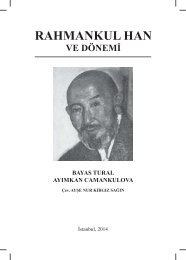THE SOVIET HISTORIOGRAPHY AND THE QUESTION OF KAZAKHSTAN’S HISTORY
SOVYET-TARIH-YAZICILIGI-ENG
SOVYET-TARIH-YAZICILIGI-ENG
You also want an ePaper? Increase the reach of your titles
YUMPU automatically turns print PDFs into web optimized ePapers that Google loves.
144<br />
<strong>THE</strong> <strong>SOVIET</strong> <strong>HISTORIOGRAPHY</strong> <strong>AND</strong><br />
In the literature of 1940s, the topic of treason was not prevalent.<br />
During the second half of 1940s, the picture dramatically changed.<br />
The state of warfare in the country deepened the oppression of the<br />
totalitarian regime on art and literature.<br />
The parameters of this systems were the composition of two fictional<br />
characters. The first character was the enemy (Nazism), who<br />
was brutal but easily beatable because he was a fool. The second<br />
was the Soviet soldier, who was the unbeatable and victorious warrior<br />
protecting his homeland.<br />
People believed in the power of the Soviet army. This belief went<br />
so far that no one considered the probability of treason among the<br />
army’s members. The ideological machine did not allow the existence<br />
of any traitorous character in literature. The existence of such a<br />
character would be regarded as a plot against socialist victories and<br />
the newly established socialist Soviet army. Needless to say, these<br />
tropes in literature were required and designed to encourage the soldiers<br />
who might going to their death. This can be explained by the<br />
military tactics used against the enemy. The issue of treason became<br />
a central topic only in 1970s-1980s in Soviet literature.<br />
To conclude, I want to present a quotation of Kazakhstani author<br />
Yu. Dombrovskiy, who experienced the persecution in1940s and 1950s<br />
and has some composed some works about this tragedy: “Our period<br />
was tough, human relations were complicated, even humans... No! It<br />
is very difficult for me to talk about the people of that time, even<br />
impossible... I was one of them. All in all, they are not those with us<br />
now, my readers. Then, we were forced to carry the toughest problems<br />
on our shoulders.”<br />
In this way, the authors’ conflict with Stalinism helped them to<br />
grasp the essence of Nazism and Communism and directed them to<br />
think about the resistance of Europe’s destiny and mankind’s spiritual<br />
power against the physical and spiritual tyranny. As nature is<br />
composed of infinite births and deaths, the governments established<br />
themselves not for the people but against them.



